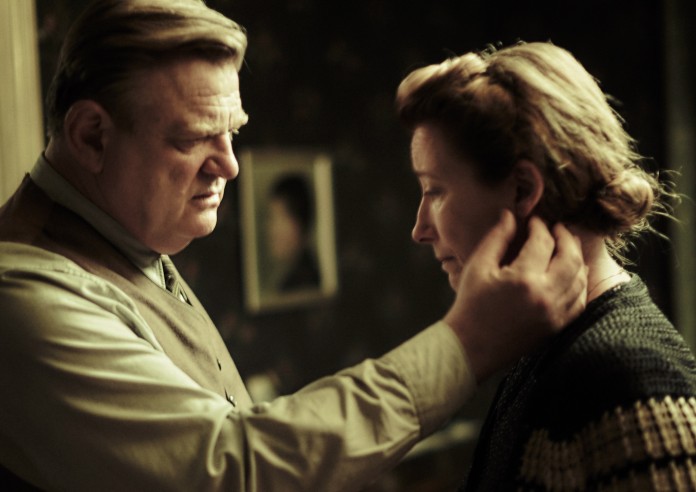Though set amidst a familiar, prosperous stomping ground in cinema – Vincent Perez’s third feature film Alone in Berlin is somewhat unique in that it delves into the horrors of the Second World War from a German perspective, as opposed to that of the English and US soldiers, or the Jewish victims. Regrettably, however, any sense of originality is carelessly deviated away from; for what transpires is a generic, tedious offering that simply doesn’t do justice to Hans Fallada’s bestselling novel.
Set in the German capital in 1940, we meet married couple Anna (Emma Thompson) and Otto Quangel (Brendan Gleeson), who are left to deal with the heartbreaking news that so many parents feared during this tumultuous time; their son has been killed in combat. Completely disenchanted by the sheer futility of war, they risk a severe and brutal punishment by the Nazis in refusing to conform to the State, going as far as leaving hundreds of anonymous postcards consisting of anti-Hitler propaganda, hoping to sway the opinions of those in the local area. Though given the fear that has been instilled in the public, the majority of the cards have been handed in to the authorities – as the Nazis begin their attempt to find out who are behind these courageous words, with Gestapo inspector Escherich (Daniel Bruhl) heading up the investigation.
Given the premise in this drama, you would expect a title that thrives in suspense, with an unbearable intensity as the mourning parents vie to remain unidentified while the Nazis vie tirelessly to uncover the culprits – but there’s no palpable dramatic tension, in spite of Alexandre Desplat’s efforts, offering what can only be described as a contrived and all-too-archetypal score providing the soundtrack to proceedings. We’re left to deal with a film we’ve seen so many times before, abiding so stringently and frustratingly to the tropes of the genre. It’s not just the screenplay, but the aesthetic and overall tone and atmosphere of the film – comparable, in that regard, to the criticisms aimed at Tom Hooper’s The Danish Girl, as another film that steered away from any sense of risk. Which, in this case, couldn’t be more at odds with the protagonist’s endeavours.
Thompson and Gleeson do all they came to bring this humdrum screenplay to life however, with two unsurprisingly accomplished displays from the venerable performers, just about making this endeavour worthwhile. Gleeson in particular turns in a brilliantly subtle performance, avoiding, at all costs, to heroise Otto Quangel, for it appears that he didn’t appear to see himself in that way. It’s not enough, however, to save this film from dipping into severe bouts of tedium that it struggles to claw its way back from.









